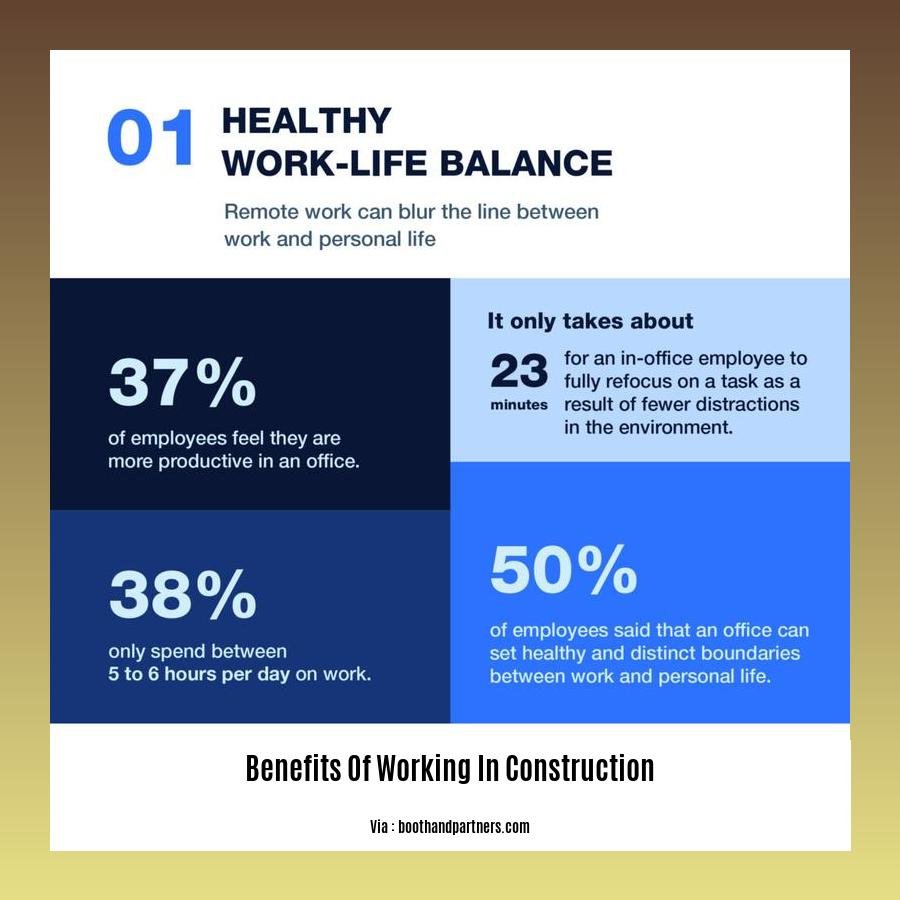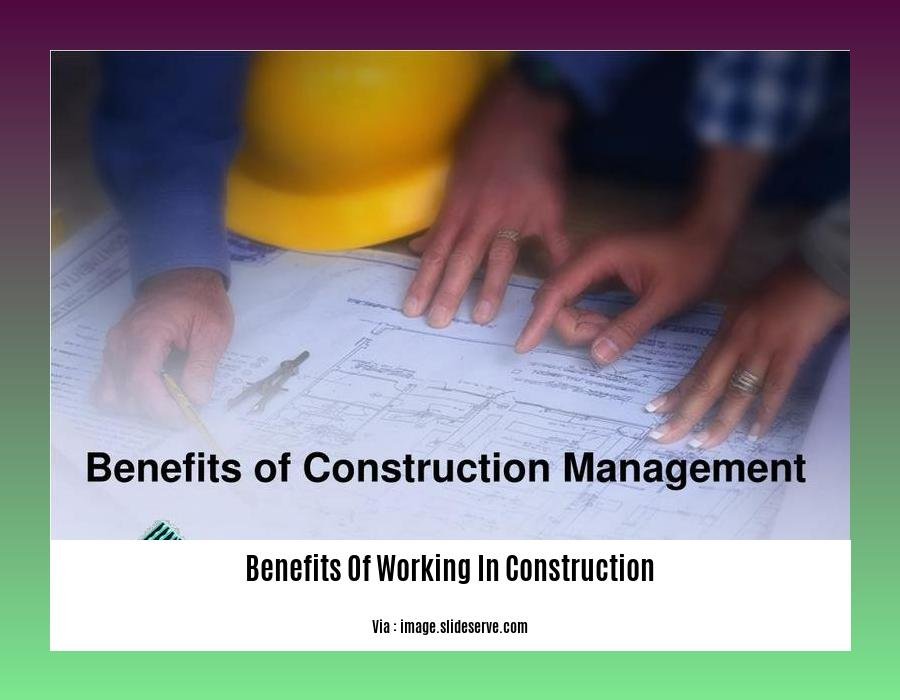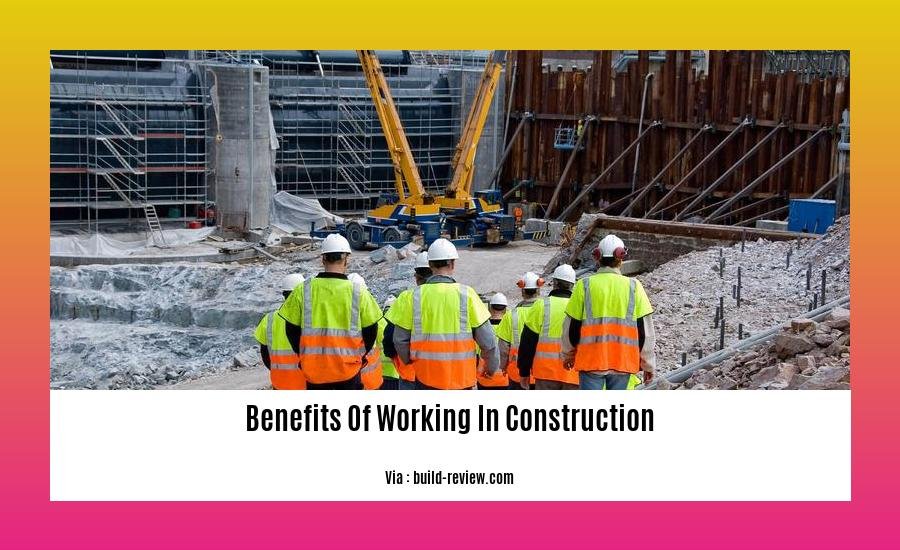Explore the rewarding world of construction! A seasoned professional with a decade of experience unveils the numerous advantages of working in this dynamic industry. From the challenges to the fulfilling moments, discover the benefits that await you in construction. Learn how project management, technical expertise, and team collaboration contribute to a career that builds more than just structures.
Key Takeaways:
- Lower Education Requirements: Apprenticeships offer alternatives to extensive formal education.
- High Demand and Growth: The industry offers ample opportunities for career advancement.
- Diverse Careers: A wide range of specialties allows individuals to find a career that aligns with their interests.
- Travel Opportunities: Construction projects often involve travel to different locations.
- Outdoor Work Environment: Workers enjoy fresh air and physical activity.
- Community Impact: The industry plays a significant role in community development.
Benefits of Working in Construction

As a seasoned construction professional, I’ve witnessed firsthand the numerous benefits of working in construction. This dynamic and rewarding field offers a wide range of opportunities, regardless of your interests or skillset.
Lower Educational Requirements and Apprenticeship Opportunities
Construction careers often require less formal education compared to other industries, with many companies offering apprenticeship programs. This allows you to earn while you learn, gaining valuable hands-on experience and reducing your financial burden.
High Demand and Career Growth
The construction industry is constantly growing, creating ample opportunities for career advancement. With a strong work ethic and dedication, you can quickly move up the ranks, assuming positions of greater responsibility and earning potential.
Variety of Careers and Specialties
From architects and engineers to project managers and skilled tradespeople, the construction field offers a multitude of career paths. Whether you prefer the technical side or the hands-on aspects, there’s a role that will suit your skills and aspirations.
Travel Opportunities
Large-scale construction projects often involve travel to different locations, both domestic and international. This can broaden your horizons, expose you to new cultures, and provide a sense of adventure.
Outdoor Work Environment
Construction workers typically enjoy working outdoors, surrounded by fresh air and engaging in physical activities. This can provide a healthier and more fulfilling work experience compared to desk-bound jobs.
Community and Environmental Impact
The construction industry plays a vital role in shaping our communities and protecting the environment. You’ll have the satisfaction of seeing your work make a tangible difference in people’s lives and the world around you.
If you’re seeking a career that offers variety, growth potential, and the opportunity to make a positive impact, consider exploring the benefits of working in construction.
Discover the benefits of construction play for early childhood development and headwall construction techniques for retaining walls and erosion control.
Diversity and Inclusion: A Cornerstone of Construction

In construction, where collaboration and teamwork are paramount, diverse work environments are not just an HR buzzword but a strategic imperative.
Impact of Diversity on Performance
Studies have consistently shown that embracing diversity in the workplace leads to tangible benefits:
- Increased productivity and profits: Diverse teams bring a wider range of perspectives, fostering innovation and problem-solving.
- Enhanced creativity and innovation: Different experiences and backgrounds generate unique ideas that drive creative solutions.
- Improved employee satisfaction and performance: Creating a welcoming and inclusive work environment boosts morale, motivation, and performance.
- Enhanced reputation and client relationships: A construction company with a diverse workforce reflects the inclusive values of its customers.
Challenges and Opportunities
Despite progress, the construction industry still faces challenges in achieving a truly diverse work environment. Only 5.4% of construction workers in the US are non-white.
To overcome these challenges, companies need to create a culture of respect, trust, and equal opportunity. This includes:
- Devising D&I strategies: Developing specific plans for recruiting, retaining, and developing a diverse workforce.
- Fostering an inclusive workplace: Establishing clear guidelines, training programs, and support systems to promote a sense of belonging for all employees.
- Challenging biases and discrimination: Addressing unconscious biases and creating a culture where all voices are heard and respected.
Key Takeaways:
- Diversity in the construction industry boosts productivity, creativity, and performance.
- A diverse workforce brings a wider range of perspectives and problem-solving abilities.
- Construction companies with diverse workforces tend to outperform their peers financially.
- Creating a healthy company culture based on respect and trust is crucial for D&I success.
- Challenges remain, but initiatives to promote diversity and inclusion are essential for the construction industry’s future.
Relevant URL Sources:
- Workforce Diversity in Construction Improves Productivity and Profits
- Building diversity and inclusion in the construction industry
Opportunity for Professional Development
Seasoned construction veterans and newcomers alike appreciate the unique professional growth opportunities this dynamic industry offers.
-
Diverse Career Paths:
Construction spans architecture, engineering, project management, skilled trades, and more, providing a plethora of avenues for career advancement. -
Mentorship and Learning on the Job:
Experienced professionals guide newcomers, fostering knowledge and skills. Hands-on experience accelerates learning and facilitates practical problem-solving. -
Continuous Training and Certifications:
Industry professionals have access to ongoing training programs and certifications that enhance their expertise and marketability. -
Educational Advancement:
Many construction companies offer tuition assistance and flexible work schedules, enabling employees to pursue higher education and further their professional development. -
Project Management Experience:
Construction projects provide a platform for developing project management expertise, including planning, budgeting, team leadership, and meeting deadlines.
Key Takeaways:
- Construction offers a wealth of professional development opportunities for individuals at all levels.
- Diverse career paths, mentorship programs, and ongoing training foster knowledge and skills.
- Project management experience and educational advancement contribute to career growth.
- The construction industry provides a platform for continuous learning and professional enrichment.
Relevant URL Sources:
- 6 Benefits of a Career in Construction – Build Your Future
- Continued Professional Development (CPD) | Go Construct
Personal Fulfillment and Impact on Community
In the construction industry, it’s not just about putting up buildings—it’s about shaping communities and leaving a lasting impact. The work we do goes beyond personal gain; it’s a way to contribute to the world around us and make a difference in people’s lives.
From constructing schools that educate future generations to renovating historical landmarks that preserve our heritage, every project we undertake has the potential to uplift our communities. It’s a rewarding feeling to know that our hard work is helping to create better places for people to live, work, learn, and thrive.
Furthermore, construction projects provide indispensable opportunities for collaboration with local residents, businesses, and organizations. By actively engaging with the community, we can ensure that our projects align with their needs and positively impact their quality of life.
Key Takeaways:
- Construction provides a sense of personal fulfillment by contributing to the well-being of communities.
- The industry empowers individuals to make a tangible impact on society through infrastructure development and community engagement.
- Engaging with local residents and organizations fosters mutual understanding and ensures that projects align with community priorities.
- Construction projects can revitalize neighborhoods, improve safety, and enhance local amenities, positively impacting residents’ lives.
Relevant URL Sources
- 5 Ways the Construction Industry Can Positively Impact Local Communities
- The Importance of Community Involvement in Construction Projects
FAQ
Q1: What are the educational requirements for a career in construction?
A1: Construction careers often offer apprenticeship opportunities, reducing the need for extensive formal education.
Q2: Is there high demand for construction workers?
A2: Yes, the construction industry is in high demand, providing ample opportunities for career advancement and growth.
Q3: What is the work environment like in construction?
A3: Construction workers typically work outdoors, benefiting from fresh air and physical activities.
Q4: Can construction workers travel for work?
A4: Yes, construction projects often involve travel to different locations, both within a region and internationally.
Q5: How does construction impact the community?
A5: The construction industry plays a vital role in community development and environmental sustainability.
- Black Backsplash Tile: Find The Perfect Style For Your Kitchen - November 6, 2025
- Black Backsplash With White Cabinets: A Bold Kitchen Design - November 5, 2025
- Black and White Kitchen Backsplash: Ideas for Timeless Style - November 4, 2025










